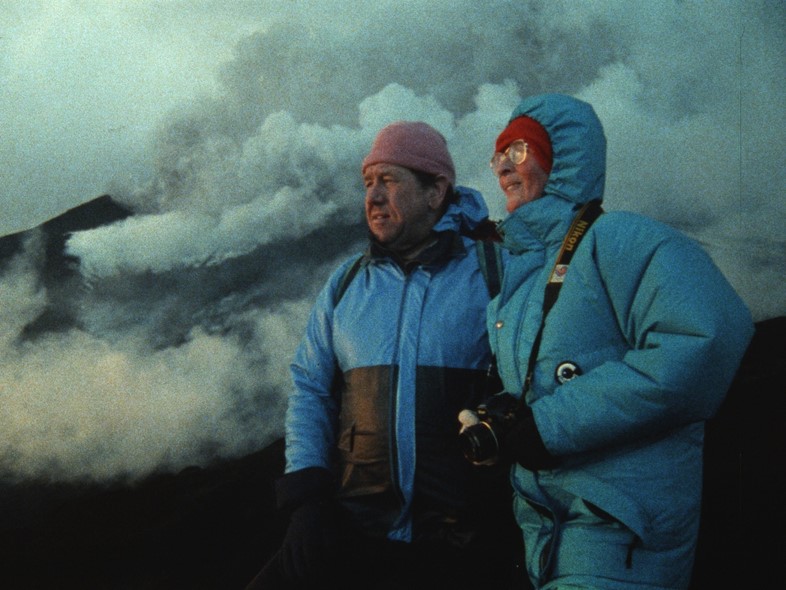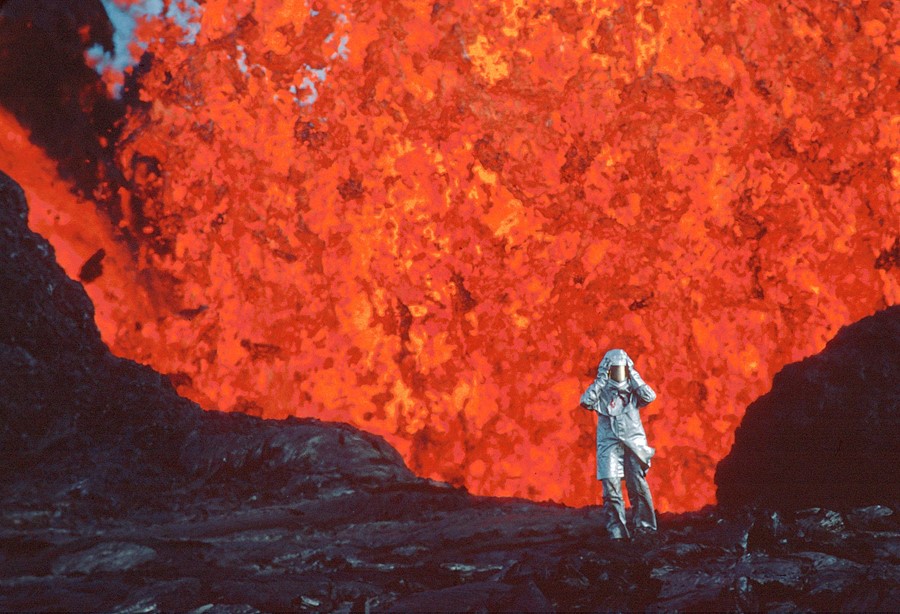As Sara Dosa’s new documentary is released, the American director discusses the remarkable legacy of Katia and Maurice Krafft – two young volcanists who showed “how alive and interconnected the world is”
“No, this is not a science fiction movie,” read the subtitles announcing a clip from Cap Sur L’Aventure, 19 minutes into Sara Dosa’s new documentary, Fire of Love. “It’s two young volcanologists dancing on the edge of a volcano. They are Katia and Maurice Krafft.” After their first meeting in 1966, the couple married four years later and would spend the rest of their lives fervently absorbed in the activity of volcanoes. In the clip from French TV, they are dressed in matching silver suits, their favoured Jacques Cousteau red hats (presumably worn to avoid camouflage), swapped for heavy, bollard-cum-stingray shaped metal helmets.
“We were looking for images of erupting volcanoes in Iceland from the 1970s,” shares Dosa, who was working on the 2019 documentary The Seer and the Unseen at the time. “That’s how we learned about them, because there’s not a massive pool of people who had filmed volcanic eruptions in Iceland in the 1970s. Once we learned about them as people we got hooked. Their imagery, of course, was spectacular, but their humour, philosophies, the fact they were married, they were in love with each other and had this unique way of living.” Working with her collaborators Shane Boris, Jocelyne Chaput and Erin Casper in the early months of the pandemic, the film was born out of a curious fascination and developed as a balm during the first lockdown.

“Personally, [the pandemic] was a time of tremendous loss and fear, so working on a project that was enchanting and transformative was such a salve,” Dosa explains. “Katia and Maurice were expert navigators of uncertainty. Through their lives, they learned how to reconcile fear. So, at that time, getting to learn about them was so inspiring.” The couple, who eventually lost their lives to an eruption at Mount Unzen on June 3, 1991, left behind a mammoth archive that doubled as both research and content for the filmmakers, while in addition to the many books, videos and photographs, friends and family also helped construct an accurate picture. Maurice’s older brother Bertrand, in particular, proved a huge source of support. “The first thing he said on our first call was ‘Katia and Maurice must not be forgotten!’ He had this kind of bombastic quality to his voice,” recalls Dosa. “He feels that there are new generations who are meeting them, understanding their legacy, and at our French premiere, he gave a beautiful introduction to the film.”
“Their family and friends always talked about how love was the thing that guided their life. Love for volcanoes first and foremost, and their partnership that supported that passion,” she continues, alluding to the love triangle at the film’s core. “There’s moments that show up throughout their life, where the more they learned about volcanoes, the more they realised they could never know. That pursuit of the unknown found resonance throughout the film for us; there’s so much we could never know about Katia and Maurice.” Elsewhere in the couple’s story, Dosa found the French writer Antoine de Saint-Exupéry to be a huge inspiration. “His quotes show up all over their work, but one that doesn’t was so instructive to us,” she says. “I’m paraphrasing, but it’s basically ‘love isn’t necessarily gazing deeply into your lover’s eyes. It’s two people standing side by side gazing at the same thing’ – that really illustrated their type of love.”
Narrated by the actor and director Miranda July, Fire of Love deals in facts and affection – arenas her tone is skilled in accommodating. “We were drawn to her, not just because of her curiosity and her vulnerability, but [because] she has such a profound way of observing human relationships,” Dosa explains of the late casting. “Miranda can go from the depths of one’s soul to the expansive nature of life on earth in such a short amount of time. It was that intimacy and universality that we were really excited to work with.” Personally fascinated by how humans make meaning of the natural world – prior to filmmaking she had ambitions of becoming a cultural anthropologist – Dosa is similarly familiar with the political potential of the film “to show how alive and interconnected the world is, and that there’s no separation between humans and nature.”
Somewhere towards its end, a quote from Maurice underscores the uniqueness of the couple’s careers. “I feel like I’m over 100 years old with what I’ve experienced,” he says. In fact, neither Katia or Maurice were even 50 years old when they died, yet they left behind a vast and distinctive archive – also utilised in Werner Herzog’s The Fire Within: A requiem for Katia and Maurice Kraft, which premiered at Sheffield DocFest in May. “I haven’t seen it yet,” says Dosa, “but Katia and Maurice’s legacy is just so expansive. I hope there will continue to be films made about them.”
Fire of Love is showing in UK cinemas now.
